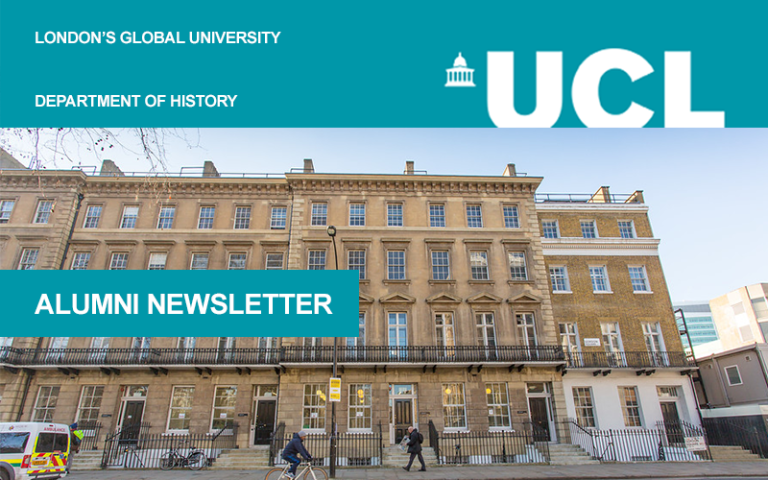
Contents
- Welcome from the Head of Department
- Spotlight on Teaching: Public History MA
- Spotlight on Research: Fragmants of the Roman Republican Antiquarians (FRRAnt)
- UCL History Impact 2022-23
- Spotlight on Students: Lapis Student Zine
- Student Success Award: Writing History Plus
- Alumni Profiles
- Alumni Piece: From Louis XVI to Warwick the Kingmaker
- Selected Publication: The Madman and the Churchrobber
- 2022-23 Events Overview
- Upcoming Event: Neale Lecture
- Get Involved
Welcome from the Head of Department
Antonio Sennis
Associate Professor of Medieval History
Head of UCL History (2023–2026)
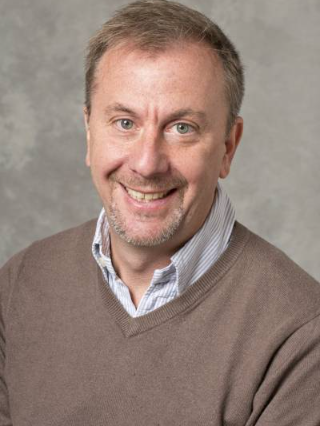
Dear Alumni,
It is a true pleasure to present you with a new issue of our annual newsletter. As you can see from the various contributions to the edition, this has been a year in which we, as a community, have experienced the thrill of success and the sadness of loss. During these past months’ highs and lows, we have been guided and kept together by Eleanor Robson, who has just finished her five-year term as our Head of Department. As Professor Robson’s successor, I would like to take this opportunity to pay tribute to her leadership and vision. As historians, we are intrigued by big questions, big processes and big dynamics. But it is in the perhaps less glamorous aspects of daily departmental life that we often find our sense of shared identity. Working under Professor Robson’s leadership has enabled all of us to develop as members of a community. It has been inspiring, motivating and fun. Thank you, Eleanor.
With warmest wishes,
Antonio
Spotlight on Teaching: Public History MA
Anna Maguire
Lecturer in Public History
Co-convenor of Public History MA
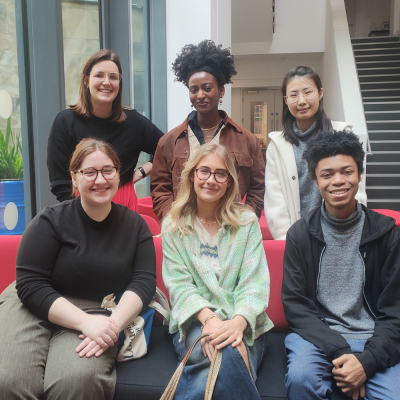
Students from the MA Public History at the MA Conference in May 2023 with Dr Anna Maguire. Image courtesy of programme student James Serieux.
This year saw the launch of a new programme at a new campus for History. The MA in Public History welcomed its inaugural cohort in September 2022. Led by Dr Mark Frost and Dr Anna Maguire, the MA offers students the opportunity to think critically about concepts and theories of doing history with and for the public and to apply this critical understanding practically through the creation of their own public history outputs. Drawing on the department's strength in public history and a consideration of how public history operates globally, students explore questions of power, ownership and authority, the challenges of making history for exhibitions, documentaries and film, and the complexities of collective memory and heritage in different political, cultural and social contexts. We have also been delighted to welcome students from MA History to many of our public history optional modules, including Migrant City: Migration, Public History and London, Remembering Conflict and Mass Violence, and Rethinking History on Screen.
One of the most exciting and unique parts of the programme is the opportunity for students to take skills developed in the classroom and apply them in their own work. Our first assignment saw students produce short audio-visual essays, covering topics from the ‘Poppy Wars’ in the UK to the Black Panther franchise as a form of restorative history. As they prepare their final projects (equivalent to dissertations) we look forward to seeing students produce a queer Jewish theatre archive, a podcast on the radical influence of Chinese poetry in translation, and a documentary about video games as historical sources.
Our work this year has been supported by UCL’s Special Collections team. In sessions with Jo Baines and Anna Fineman, students were given hands on experience with working with objects. Jo and Anna were also two of our ‘clients’ for the group research projects that students undertake in Term 2, asking students to develop public history responses to the Small Press collection using Wikipedia and to Archiving UCL East respectively.

A session on object-based learning on the core module, facilitated by Jo Baines, Academic Liaison Librarian / Archivist - Special Collections, UCL East.
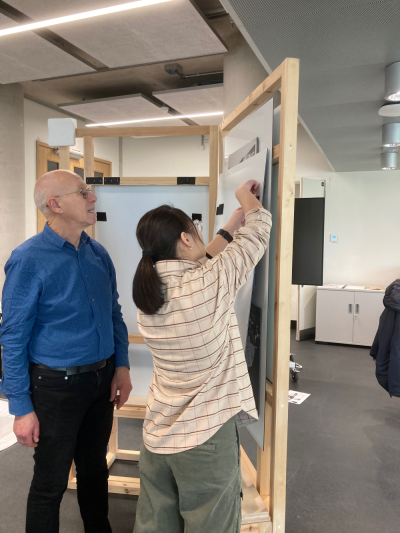
Yuxuan Wang helps to install the SE1 Stories Exhibition in the Urban Room. Image courtesy of Kara Blackmore.
The MA is based at UCL’s new campus, UCL East, in One Pool Street. On the edge of the Olympic Park,UCL East takes its place as part of the East Bank complex, with partners including the V&A, Sadler’s Wells and the BBC with whom we look forward to working with in future. One Pool Street is home to the public facing UCL Urban Room hosts events, exhibitions, workshops and engagement with local stakeholders, professional audiences, and the wider public, whilst the Memory Workshop expands access to UCL’s public and oral history collections and equipment, forging dialogue between UCL researchers and local community partners. Supported by the curator, Kara Blackmore, students have got stuck into the exhibitions and programming taking place in this space. In September and October 2023, we look forward to celebrating our students’ final project work at the first student showcase to be held in the Urban Room, along with students from Global Urbanism and Connected Environments.
Our home in East London has created exciting opportunities for collaborating with communities and partners in the area. As part of their group research projects, two of our students partnered with projects for Newham Heritage Month. Gwendolyn Wallace worked with REIN, a charity supporting rights and equality in the borough, creating a series of workshops for young people to explore what creativity in the borough means to them. Kate Liggins worked with artist Hafza Yusuf researching Newham born artist Sonia Boyce to develop creative programming for the festival. Kate and Eleanor Wright also came together as volunteer oral historians to create an audio record of Flotilla, a major new artwork by Melanie Manchot, funded by UCL and the Royal Docks as part of the Sea Change Sustainability season. Our oral history support in East London continues as Anna Maguire works with the Voices of East Bank project to empower community researchers to capture the stories of the people they work with.
We look forward to welcoming our new cohort in September and continuing this exciting and innovating programme.
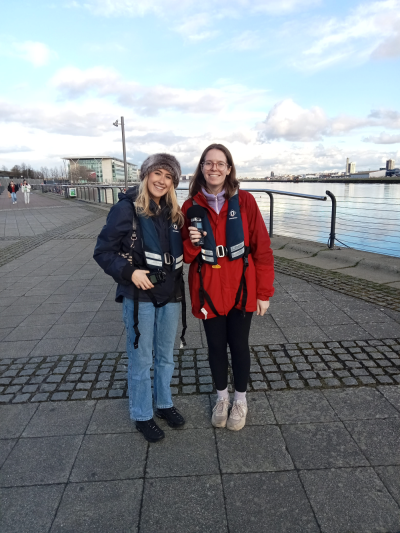
Kate and Eleanor at the Royal Docks on filming day in March.

James enjoys one of the listening stations at our screening and listening event at UCL East in June.
Spotlight on Research: Fragmants of the Roman Republican Antiquarians (FRRAnt)
Richard Marshall
Research Fellow
Valentina Arena
Professor of Ancient History
Lead Investigator of FRRAnt
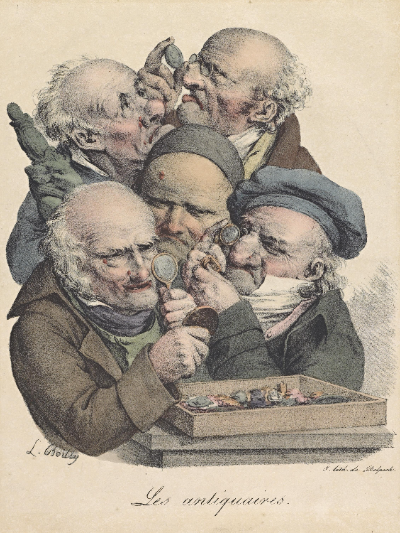
Louis Lepold Biolly, Les Antiquaries (1823).
‘(The term nefarius, “nefarious”) derives from far, “spelt”, since adoreum, whose consumption is forbidden to those who have committed a crime, is spelt, not wheat ...’ [Varro, De uita populi Romani I, fr. 31Pittá]
In 2020, Professor Valentina Arena was awarded funding for a five-year project by the European Research Council to analyse the works of a group of Roman writers generally labelled as ‘antiquarians’. These authors dealt with Roman customs, religion, literary history, and the rules and regulations of institutions, but contrary to the chronological approach of narrative history writing, they adopted a synchronic arrangement and placed great emphasis on etymology and the collection of all the evidence related to a given phenomenon, without necessarily evaluating its relevance in relation to particular problems. Adopting a more philological method for ‘doing’ history, they moved from the present to reconstruct their past. So, the example above, in which the antiquarian Varro attempts to link the word nefarius (actually from nefas, ‘not licit’) with a ritual prohibition against the consumption of adoreum, spelt.
There are two main problems any scholar has to face when dealing with the works of the antiquarians: first, they are mainly preserved in a fragmentary state and must be reconstructed through the quotations of later authors, and second, later scholarship has tended to divide this material into subfields of knowledge such as grammar, law, and history, so obscuring its deeper continuities and undermining its collective contribution to the political and philosophical debates of ancient Rome.
Aided by an international team of scholars, the aim of the project is to transform our understanding of Roman Republican culture by firmly establishing a new textual and contextual framework for the study of antiquarian knowledge. For the past two years, the team has been reading the key texts of ancient literature that play a fundamental role in the antiquarian tradition in search for fragments of Roman antiquarian lore and writings, and then recording them into a specially designed database. This work forms the basis for a new print edition of the Roman Republican Antiquarians, organised by individual authors, with translations, commentary on individual fragments, and extended introductory essays on each antiquarian and their works. The database, hosting all texts and translations, will be made freely available online. In addition to work on the database and edition, FRRAnt has hosted a wide variety of events, research seminars, workshops, reading groups, and in February 2023 at UCL a major international conference to explore Roman Republican Antiquarianism in its Hellenistic context. Next year, alongside a workshop on antiquarianism in poetry and prose, FRRAnt will host a conference in Rome to investigate the links between Roman and Early Modern Antiquarianism.Next year, alongside a workshop on antiquarianism in poetry and prose, FRRAnt will host a conference in Rome to investigate the links between Roman and Early Modern Antiquarianism.
By gathering, translating and interpreting the complete surviving evidence about the antiquarians of the Republic and making widely accessible a body of texts that have never been seen together in their entirety, FRRAnt hopes not only to broaden the horizons of scholarly debates about the construction of knowledge and the political and religious culture of the Roman Republic, but also to transform the study of those later periods, which looked back at Rome as a focal point of cultural reference.
UCL History Impact 2022-23
Angus Gowland
Professor of Intellectual History
Departmental REF Lead

Chair and Commissioners of the Independent Commission for Equity in Cricket. Left to right: Michelle Moore, Sir Brendan Barber, Cindy Butts (Chair), Dr Michael Collins and Zafar Ansari.
In recent years, public engagement and impact beyond academia have become increasingly important dimensions of the research conducted by UCL historians. Many of you will already be aware of the critical and ground-breaking work, begun in 2009 and with ripple effects that continue to grow in Britain and beyond, of The Centre for the Study of the Legacies of British Slavery. Now, under the directorship of Professor Matthew Smith, the Centre has entered a new phase of research and activities on slavery and its legacies in Britain and the Caribbean. These include a major project led by Professor Smith, focusing on the positive contributions of enslaved people: Valuable Lives: Black Unfreedom and the Collapse of Slavery in Jamaica. Working with under-served majority Black communities, Valuable Lives seeks to enhance awareness of Black contributions to innovation in the Industrial Revolution and beyond. One fascinating element of the project, coordinated with Professor Margot Finn and Dr Jenny Bulstrode, is planning the introduction of Black innovation history on national curricula in schools in England and Jamaica.
As you will see in the newsletter item on Public History from Dr Anna Maguire, we now have two dedicated public historians in UCL History. Dr Maguire is currently developing a project, Paths to Public History, which works with communities and partners in East London to enhance understanding of the history of immigration and its teaching in schools. Also on the public history front, Professor Sophie Page has just been awarded a Trellis 4 grant with an artist to work on an East London community project.
Dr Mark Frost, whose research focuses on the popular memory of war, empire and decolonization in modern Asia, is the founder of the War Memoryscapes in Asia Project, which brings together scholars from various disciplines and universities across the globe sharing an interest in the study of war remembrance in Asia in its multiple forms. Dr Frost’s project, Memorialization and Heritage in Sri Lanka, explores the role of heritage, remembrance and peace-making in the shadow of Sri Lanka’s violent past. He plans to produce a series of short films exploring memorialization sites to be made publicly available and incorporated into courses taught at the University of Columbo and elsewhere.
The research activities of other staff members in UCL History are designed to have a similarly substantial impact beyond academia. Whilst serving as Head of Department, Professor Eleanor Robson has continued as Director of the Nahrein Network, an interdisciplinary research project enabling Iraqi historians and cultural heritage researchers to contribute to Iraq’s sustainable economic, social and cultural development.
Professor Coşkun Tunçer has just begun work on Domestic Public Debt in Emerging Markets from the First Financial Globalization to the Interwar: 1880–1945, collaborating with academic colleagues in Brazil and Switzerland. This project, sadly increasingly relevant in today’s economic conditions, aims to provide historical frameworks and data to inform financial policy development at the IMF and other international institutions.
Finally, those of you who are cricket fans – as well as many who are not – will be aware of the recently published report of the Independent Commission for Equity in Cricket, set up by the England and Wales Cricket Board (ECB) to investigate the issues of inequality and discrimination in cricket. This revealed important and uncomfortable truths about deeply rooted structural and institutional forms of racism, sexism and elitism that have long pervaded the game in England and Wales. UCL History had a significant presence on the Commission in the person of Dr Michael Collins, whose research on Black cricket was included in the 10,000-word historical account given in the report and underpinned its conclusions about the necessity of the public recognition of historical discrimination and injustice.
Dr Collins’s research in this area began with Windrush Cricket, a small-scale inquiry into the cricket-related experiences of Hackney’s local Black Caribbean population. However, as the scale and urgency of the issues it revealed became apparent, his work grew to encompass the wide-ranging and entrenched social and economic barriers the traditional institutions and culture of English and Welsh cricket has erected. The recognition of its significance led to the appointment of Dr Collins as one of the four commissioners tasked with investigating and reporting on the social condition of the game. The report’s publication on June 27 received widespread and detailed media coverage. Its deeply sobering impact can be measured in the public reaction of Ben Stokes – the captain of the English Test side – on the day of the report’s release, in calling for more inclusivity and diversity in a game that ‘should be enjoyed without fear of discrimination or judgement whether that be due to your upbringing, race or gender’. The article also appeared in: The Guardian | FT | Sky | BBC | The Guardian 2.
Spotlight on Students: Lapis Student Zine
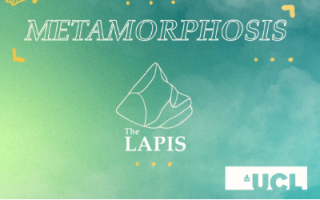
Read 'Metamorphosis' here.
Student Success Award: Writing History Plus
Jon Chandler
Associate Professor (Teaching) in History
Lead of Writing History Plus Programme
Our team received a grant from the UCL Student Success Fund to scale up the successful and award-winning Writing History Plus (WH+) programme that currently benefits undergraduate students in UCL History.
WH+ has offered targeted support to undergraduate students since 2019. Our research suggests that continuing students with average marks at 59.50 or below who participate in the programme experience significant improvement in their academic performance. WH+ provides a space for students to meet with a mentor to review their progress, discuss their ambitions, and work towards academic targets in partnership with personal tutoring. These students are often the first in their family to go to university, come from minoritised backgrounds, have additional pressures (e.g. caring, work) on their time, and otherwise face further circumstantial, structural, or systemic barriers to success. The programme contributes to a key area of UCL's Departmental Awarding Gap Strategy.
The grant will enable us to develop a toolkit and workshop to support other departments in the Faculty of Social and Historical Sciences to introduce their own academic mentoring schemes. An initial pilot will run in the Institute of Americas and History of Art. We hope to be in a strong position to bid for further funding to expand the scheme in 2023/24.
Alumni Profiles
Katherine Pangonis
Author
MA Medieval and Renaissance Studies, 2018
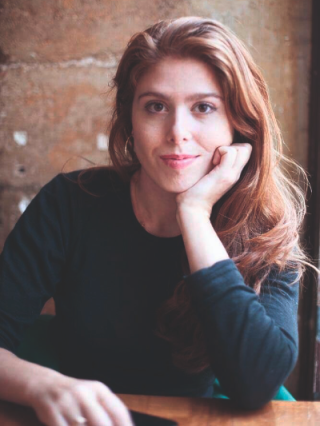
After my MA I went straight into a corporate communications role which I quickly realised wasn't for me. It wasn’t fulfilling, and I wasn’t using the research, writing and analytical skills I’d spent my university career developing. It was hard to go from academic research and Byzantine palace intrigue to pouring over PowerPoints. I started getting up early to write and sending out my work. Soon, I had a book proposal on women rulers in the medieval Middle East accepted by a UK publisher. I handed in my notice and got on a plane to Lebanon with a bag full of books. I haven’t looked back.
I spent the next year travelling around the Middle East – researching the lives of Morphia of Melitene and her formidable daughters and granddaughters. This research turned into Queens of Jerusalem – the Women Who Dared to Rule – which was published in February 2021 and has now been optioned by Amazon Studios. During my research for this book, I visited Tyre in Lebanon and Antakya in southern Turkey and was drawn in by the layers of history in these cities. This formed the basis of my new book – Twilight Cities – Lost Capitals of the Mediterranean – published in July.
These days, my research hinges as much on interviews and exploration as academic research. I speak to people and travel as much as I read. To inform my work I have also volunteered on several archaeological digs in Sicily and the Middle East.
I’m grateful every day to have had the opportunity to study at UCL and now to travel and keep learning in my professional life. Being in the Middle East has been a life changing experience, and I hope to keep bringing the history of this region to a wider audience.
Dan Foy
Head of G7/G20 Sherpa Office, Cabinet Office (from Foreign Office)
BA History, 2015
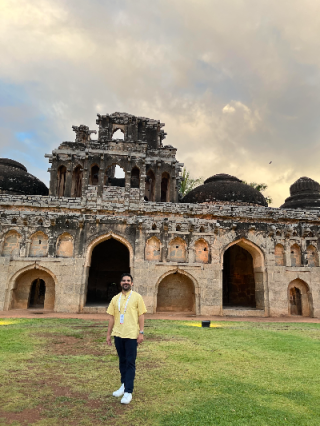
I graduated from UCL in 2015 with a BA in History. My studies focused predominantly on the 19th and 20th century, spanning the US, Australia and even some China for good measure – each of which has happily cropped up professionally since.
I started at the Foreign Office (on the Diplomatic Fast Stream) later that autumn. I joined wanting to advance the UK’s national and international security interests, albeit without really knowing what that meant. But across a variety of roles, I’ve been fortunate enough to do just that — spending time covering issues spanning NATO and nuclear non-proliferation, to cyber threats and foreign interference.
Those areas of interest took me to Australia on posting for three years in 2018. Going to Australia at such a critical time in our bilateral relationship was a great challenge. In the wake of our departure from the European Union, and as the balance of geopolitical power has continued to swing to the Indo Pacific, there was no better place to be. But above all, it meant I could keep playing cricket: my real obsession and the subject of my dissertation at UCL History!
Now back in the UK, I lead the team responsible for the UKs engagement in the G7 and G20 Summits (my photo above was taken in Hampi at the recent G20 Sherpa meeting). We support the Prime Minister to deliver multilateral responses to some of the most complex global challenges we face – from sustainable development and climate change, all the way through to Russia’s invasion of Ukraine. This has offered a privileged vantage point and granted me some amazing memories – none more so than seeing Vlodomyr Zelenskyy at the G7 Summit in Hiroshima this May. As a historian that felt profound!
Sushma Jansari
Tabor Foundation Curator South Asia, British Museum
MA Ancient History, 2006
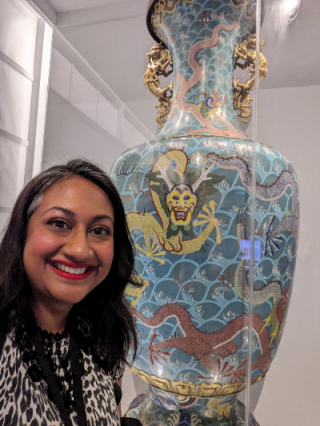
I have been fortunate to work on lots of exciting projects. Currently, I am working on a major exhibition focusing on ancient South Asia, and previously I was Lead Curator for the Manchester Museum South Asia Gallery in partnership for the British Museum (opened 2023). I also curated the ancient to mediaeval South Asia displays in the Sir Joseph Hotung Gallery for China and South Asia (opened 2017). My first book was recently published with UCL Press Chandragupta Maurya: the creation of a national hero in India. It is Open Access so anyone, anywhere in the world with an internet connection can download and read it for free!
Issie Pratsis
Public Events Executive, RAF Museum
BA History, 2021 / MA History, 2022
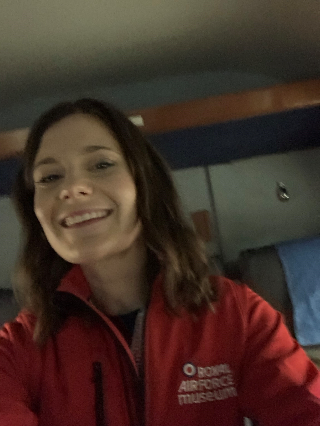
I joined the RAF Museum as a Public Events Executive, delivering an ambitious and educational public events programme aimed at families; these have ranged from May half-term’s 1940s Week, which explored life in London during the Second World War, and our sleepover for Scout and Brownie groups, Pillows and Pilots. Our current project is “The RAF Museum presents Horrible Histories: Up in the Air Adventure”, from 22 July at both our London and Midlands sites. This is an inspiring event for the Museum: to bring the Horrible Histories book “Up in the Air” to life, exploring the history of flight, blunders and crashes!
My time with the History Department at UCL thoroughly prepared me for my career in Heritage and Museums. I can translate my passion for History in an accessible and engaging way, and I get to use the principles of Public History daily to welcome a diverse audience to the Museum and explore the lives of those who have shaped the RAF and the stories of the last 106 years.
Adam Dyster
Advisor to the Director-General and Chair of the National Trust
BA History, 2015
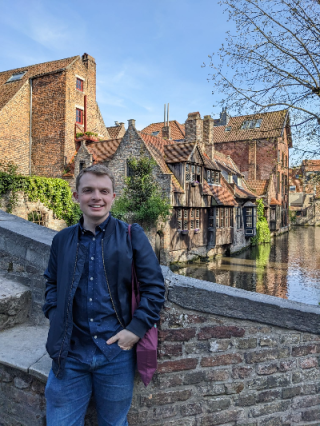
After graduating, I was a marketing internship at my local theatre, which built my PR skills and was a lot of fun. I then joined the think tank IPPR for an events internship, building on my events experience as Social Sec and working across IPPR’s different policy areas. I started my first non-intern role in 2017, as National Organiser at SERA, Labour’s Environment Campaign, lobbying the Labour party on environmental issues. I was the only paid employee, responsible for everything from social media to fundraising, so it was a lot of work (not helped by the snap 2017 election), but it meant I developed rapidly and networked a lot.
I joined the National Trust in 2018, first as Parliamentary Officer, lobbying MPs and Peers on issues from farming to the care of historic buildings. It was the perfect role for me: combining my political and environmental work experience, and my love of history. When the Trust became involved in debates around the history of slavery and empire, I found myself looking back to work I’d studied during my BA!
Finally in 2021, I was asked by the Trust’s Director-General, Hilary, to join her team as Advisor to her and the Chair. The easiest comparison is to a Special Advisor for a Government Minister: I work on speeches and publications, briefings, stakeholder management and strategy, as well as keeping an eye out for any emerging issues. It’s a fascinating role – constantly keeping me on my toes and using every bit of the skills I’ve developed so far – from event management and comms to politics and policy!
Neil Loughlin
Lecturer in Comparative Politics, City, University of London
BA History, 2008
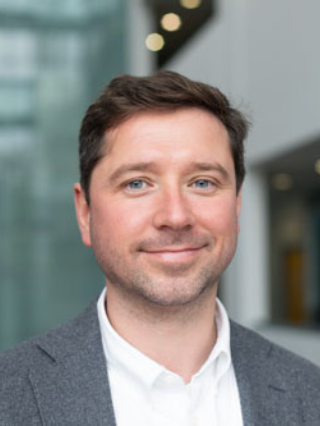
After finishing at UCL in 2008, I spent a few years figuring out what I wanted to do while temping around London. I struggled to find something permanent, not helped by the global financial crash. Eventually, I started working towards a career in development and human rights, working part-time for charities and research organisations while I completed an MSc at SOAS in International Politics.
After finishing my MSc in 2011, I moved to Southeast Asia, working for local human rights and development organisations. I was mainly in Cambodia, focusing on land rights as well as democracy and governance issues - this profoundly impacted me. It was a politically tumultuous time for the country as the popular opposition movement seriously threatened the long-ruling authoritarian regime, only for the challenge to be brutally put down by the government.
After several years in Southeast Asia, I returned to the UK to undertake a PhD, again at SOAS, focusing on authoritarian politics. Afterwards, I managed to secure a postdoc in Leiden while also teaching at other universities in the Netherlands. Although I was stuck in the precarity of early-career academia for a while, miraculously and very fortuitously, I landed a permanent job lecturing in comparative politics at City, University of London, where I now work. I continue to research authoritarian politics and the political economy of development, primarily focusing on Southeast Asia, and I am lucky to teach a variety of politics courses to some outstanding students.
Alumni Piece: From Louis XVI to Warwick the Kingmaker
Dr Peter Burley
I did a first degree at the University of York and was then able to undertake research at UCL, starting in 1970, on the late French Ancien Regime. I hugely enjoyed the experience of being immersed in academic research and the rich social and cultural life UCL offered. It was, however, undeniable that a career teaching in higher education would not be an easy option, so I looked elsewhere to earn a crust.
I joined the then Greater London Council. I was moved to the Inner London Education Authority and did well until Margaret Thatcher had other ideas about my career progression. I escaped the wreck of that phase of London-wide local government to move to the regulating of health professions. This proved to be a very agreeable environment, and one where skills learned in research were invaluable – for example, in dealing with massive files on fitness to practise cases. In fact, all my posts have confirmed the value of the transferable skills from the discipline of history.
I kept in touch with both universities and a French history seminar group at the Institute of Historical Research (IHR). The seminar group taught me a great deal about how to present and debate historical research – what works and what pitfalls to avoid. This connection led to a commission to write a book on the French Revolution for its bicentenary. I also researched and presented a season of films about the Revolution at the National Film Theatre (“A Farrago of Nonsense” – the title taken from a review of the 1952 film Scaramouche).
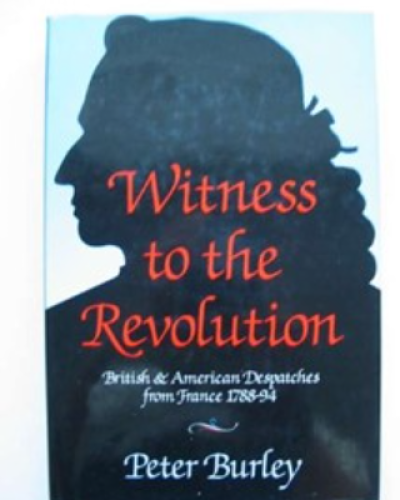
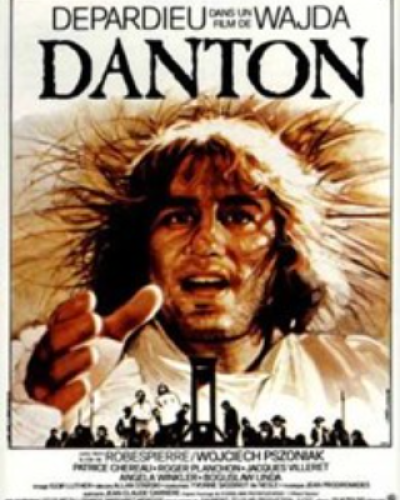
Ten years later, I was asked to provide the historical background for a local planning inquiry about land that had been a Wars of the Roses battlefield. This led to playing a role in the Battlefields Trust and, in turn, to being commissioned to write a book on the Battles of St Albans (published in 2007 and still in print!). I was appointed to the national committee organising the Magna Carta 800 celebrations through the Battlefields Trust; a high-light was a drinks reception at 10 Downing Street.
I also joined the local history society where I live – the St Albans and Hertfordshire Architectural and Archaeological Society – and am now its Vice-President. In that capacity, and with the credentials above, I was asked to research exhibits and write the commentary for a significant exhibition in the St Albans Museum + Gallery on the Second Battle of St Albans (1461). This ran from March to June 2023 and enjoyed good reviews. The first exhibit shown is a 1521 portrait of Henry VI, who was on the battlefield, from a panel set into a communion rail in Cornwall. A version of this hung until the Reformation in a church in St Albans that he visited (and where we got married!). It had the caption “the Blessed Henry, King and Martyr”. The second exhibit is a road sign from 2014 alerting motorists to a re-enactment of the battle, but – wonderfully- leaving out the word “re-enactment”.
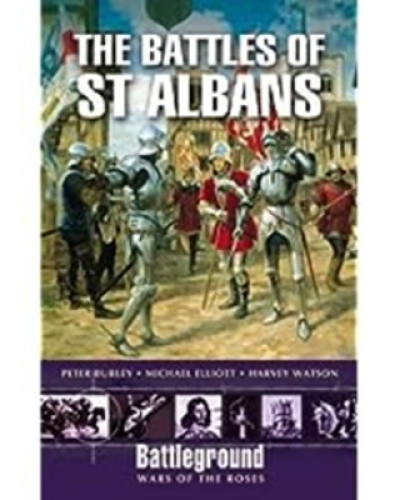
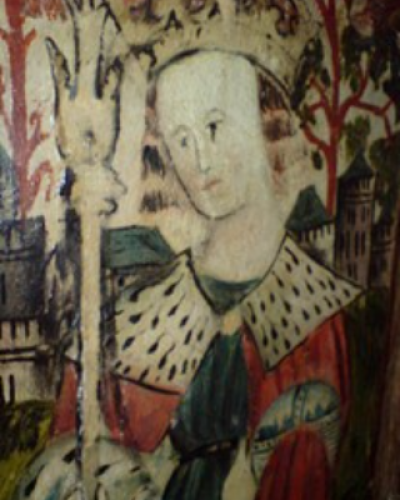
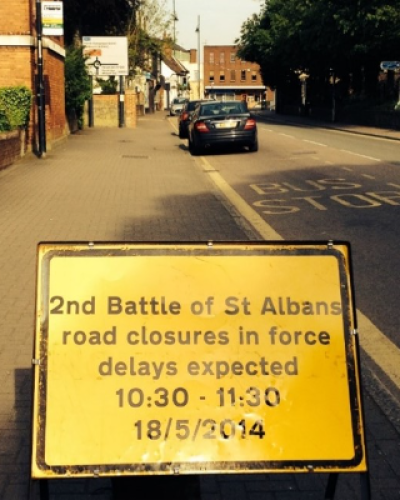
I have continued to write, lead walks, and deliver talks on historical themes to many local societies and the UCL and York alumni groups. I am now chair of the London branch of the York Alumni Association. Here I am leading a group of York alumni on a guided walk around the Barbican Estate in the City of London.
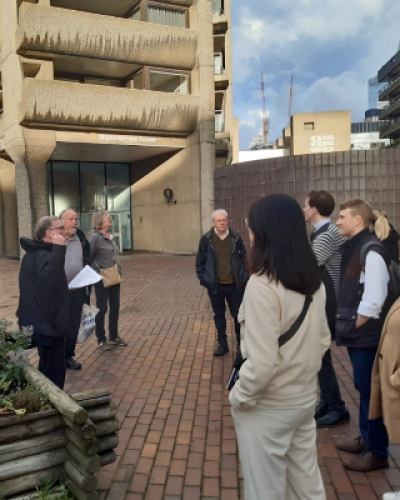
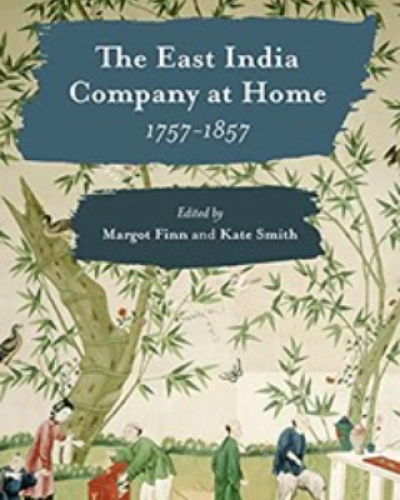
On the purely academic front, I have been working with UCL’s “The East India Company (EIC) at Home” project in the context of a local stately home (now demolished) having been owned by EIC “nabobs”. A pleasure in this collaboration was having lunch with Prof Margot Finn in a building in St Albans, founded as a bank funded by EIC money.
I could only have continued to work as a practising historian with the help and support of UCL and the IHR. I cannot commend too highly graduates staying in touch – or re-engaging – with their universities.
Selected Publication: The Madman and the Churchrobber
Jason Peacey
Professor in British History
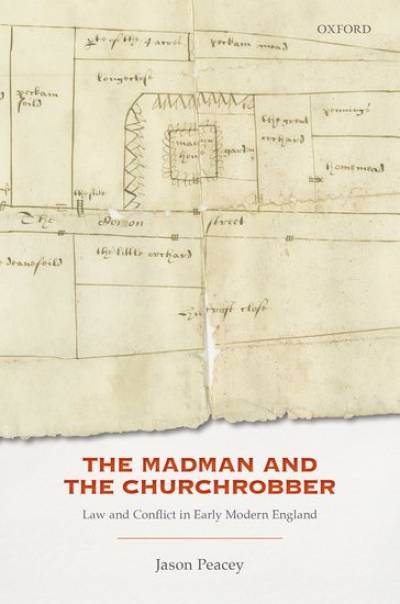
This microhistory reconstructs and analyses a protracted legal dispute over a small parcel of land called Warrens Court in Nibley, Gloucestershire, which was contested between successive generations of two families from the mid-sixteenth century to the early eighteenth century. Employing a rich cache of archival material, Jason Peacey traces legal contestation over time and through various courts, as well as in Parliament and the public domain. He contends that a microhistorical approach makes it possible to shed valuable light upon early modern England's legal and political culture, not least by comprehending how certain disputes became protracted and increasingly bitter and why they fascinated contemporaries. This involves recognising the dynamic of litigation in terms of how disputes changed over time and how those involved in myriad lawsuits found legal reasons for prolonging contestation. It also involves exploring litigants' strategies and practices and competing claims about how adversaries behaved and incompatible expectations of the legal system. Finally, it involves teasing out the structural issues in play regarding the social, cultural, and ideological identities of successive generations. Ultimately, this dispute addresses important historiographical debates surrounding the nature of civil litigation in early modern England and provides new ways of appreciating the nature, severity, and visibility of political and religious conflict in the decades before and after the English Revolution.
2022-23 Events Overview
We recap a selection of events from this past academic year through staff write ups and recordings.
Professor Amélie Kuhrt Memorial
19 June 2023
Eleanor Robson
Professor of Ancient Middle Eastern History
Head of UCL History (2018–23)
We began 2023 with the very sad news that Amélie Kuhrt, our beloved Professor Emerita of Ancient Near Eastern History, had passed away very suddenly at the age of 78. At her very well attended funeral in January, in beautiful Epping Forest, I pledged to organise a celebration of her life, work and legacy, bringing together her former UCL and University of London colleagues and students with friends and family. As her successor in the post, it also felt like a fitting end to my five-year term as Head of Department.
So, on Monday 19 June over sixty people gathered in the Institute of Archaeology — Amélie’s long-time base – to remember her many amazing qualities and influences. Some had travelled from the USA and Germany; others had just walked down the stairs or round the corner. All were very welcome, as the sun shone down on the Institute’s plant-filled roof terrace and staff common room over lunch.
The afternoon’s talks included reminiscences from Professor Tessa Rajak, Amélie’s closest friend when they were graduate students; Professor Robert Morkot and Dr Lindsay Allen, her former students; departmental colleagues and friends Professors David d’Avray, Axel Körner, and Nicola Miller; and her daughter Dr Natasha Kuhrt. I also spoke on her influence and legacy, representing those who were not able to attend. We then returned to the roof terrace to raise a glass in Amélie’s honour and memory.
Contribute your memories to the Padlet
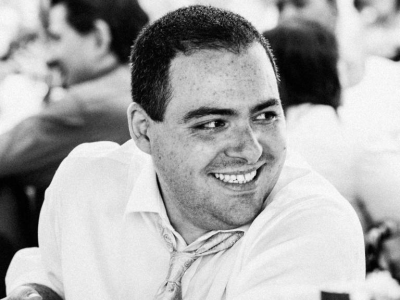
Dr Aaron Graham Memorial
30 May 2023
Jon Chandler
Associate Professor (Teaching) in History
UCL History came together on 30 May to mourn the loss of Dr Aaron Graham who passed away after a short illness. We gathered to remember Aaron and his considerable contribution to our departmental community. The memorial was conducted on behalf of the department by Revd. Reid Humble, the UCL Chaplain and Interfaith Advisor. The occasion was reflective and non-religious, but to honour Aaron’s Jewish identity, we were led in a Memorial Prayer for the departed by Rabbi Gavin Broder, the Jewish Chaplain for UCL.
The memorial was an opportunity for our community to come together in grief, to offer our support to Aaron’s family, to share our memories, and to give thanks for his life. We heard from Aaron’s parents, a few departmental colleagues, and stories from some of his students. We shared how Aaron as a son, a teacher, a collaborator, and friend, had touched so many lives. He was a wonderful colleague, an outstanding teacher, and an exceptional historian. We shall miss him.
Contribute your memories to the Padlet
Elsa V. Goveia Series
25 May 2023
Matt Smith
Professor of Caribbean History
Director of the Centre for the Study of the Legacies of British Slavery
The UCL Centre for the Study of Legacies of British Slavery launched a Speaker Series honouring one of UCL History’s most distinguished graduates, the Guyanese historian Elsa V. Goveia in 2022. Our inaugural speaker was Professor Jennifer Morgan (New York University) who, on 18 May 2022, delivered a fascinating lecture based on new research, titled, 'The Measure of Their Sadness: Slavery and Private Life in the Early Black Atlantic'.
This year the Centre proudly held its second lecture on 25 May 2023, which was delivered by Professor David Lambert (University of Warwick). Professor Lambert's lecture was entitled, 'Of Uncertain Rank: The West India Regiments in British Imperial Culture'. It was based on a major project on the First West India Regiments in the British Caribbean, the subject of Professor Lambert’s upcoming book, Of Uncertain Rank.
For over a century, the West India Regiments were an anomalous presence in the British Army: raised in the late eighteenth-century Caribbean in an act of military desperation, their rank-and-file were overwhelmingly men of African descent, initially enslaved. As such, the regiments held a unique and uncertain place both in the British Army and the wider British Empire for over a century, until their final disbandment in 1927. The lecturer argued that the image of the West India Regiments mattered. Their military spectacle shaped public perceptions in the Caribbean societies in which they were raised, and impacted on how they were deployed there and in Africa. Professor Lambert’s close examination with the use of several slides of contemporary visual and textual representations of these Black soldiers, opened a complex and hitherto little explored insights of the Black soldier in the Caribbean as sitting at the intersection of discourses about racial difference, slavery and freedom, savagery and civilisation, and heroism and military service during the ‘long’ nineteenth century.
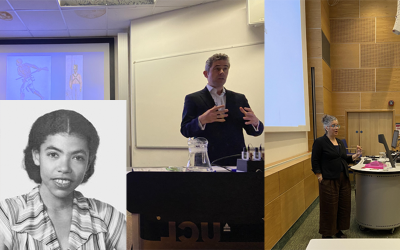
You can learn more about Elsa Goveia's career, including her time at UCL and in London, in a short video titled 'Reflections' produced by the History Department at the University of the West Indies, Mona. Look out for the 2024 Elsa V. Goveia event which you are all warmly invited to attend.
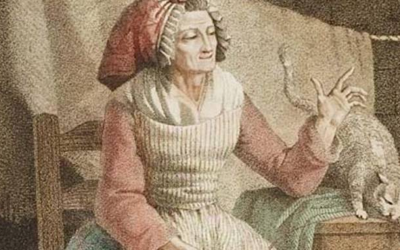
'Skills, Objects, Representations: Material Culture and the French Revolution'
Co-organised by Simon Macdonald (History) and Richard Taws (History of Art)
22 May 2023
Simon Macdonald
Associate Lecturer in Modern European History
Perspectives on material culture have helped promote a rich and interdisciplinary scholarship renewal around the French Revolution. Based on a collaboration between the Departments of History and History of Art at UCL, this workshop sought to showcase these trends and to contribute to their continuation by bringing together a range of leading international scholars to foster interdisciplinary engagement and exchange. The event included a keynote talk by Professor David Garrioch (Monash), two panels of three papers each and a concluding roundtable discussion. It succeeded in its interdisciplinary aims while also drawing a large audience, ranging from sixth-form pupils to research students and academics from UCL and elsewhere. The workshop received funding from the UCL IAS and the History External Engagement committee, which the co-organisers gratefully acknowledge.
'Populism and History': Alumni Event
23 May 2023
Sophie Page
Professor of Medieval History
On 23 May, we were thrilled to hold our annual roundtable alumni event. Thank you to everyone in the alumni community who joined us in person and online. We heard three brilliant short talks on ‘Populism and History’, and a drinks reception followed the Q&A in the North Cloisters.
Professor Hans van Wees spoke about ‘Demagogues and populism in classical Athens.’ Dr Patrick Lantschner’s contribution was on ‘Cities and Populism: The Medieval Evidence’, and Professor Heather Jones spoke about ‘The British Monarchy in the First World War.’ The lively roundtable discussion and Q&A ranged from thinking about the relationship between democracy and populism to questioning whether its resurgence was inevitable in our own times. It was wonderful to see so many staff, students and alumni from different generations at the reception, and we very much hope that you will join us for the Neale Lecture on 23 November 2023 and the Alumni Event in May 2024 on ‘Social Media and History’.
Upcoming Event: Neale Lecture
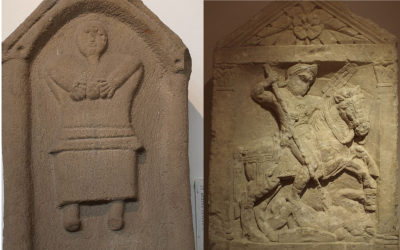
Neale Lecture: Decolonising Ancient Empire: Roman Imperialism, Britain and Africa
23 November 2023
David Mattingly
Professor of Roman Archaeology
University of Leicester
Get Involved
Stay up to date with UCL History News and Events. If you have any ideas for alumni engagement and events, contact our Communications Manager, Izzie Harvey. We are excited to bring you new alumni opportunities in 2023-24 - watch this space!
 Close
Close

